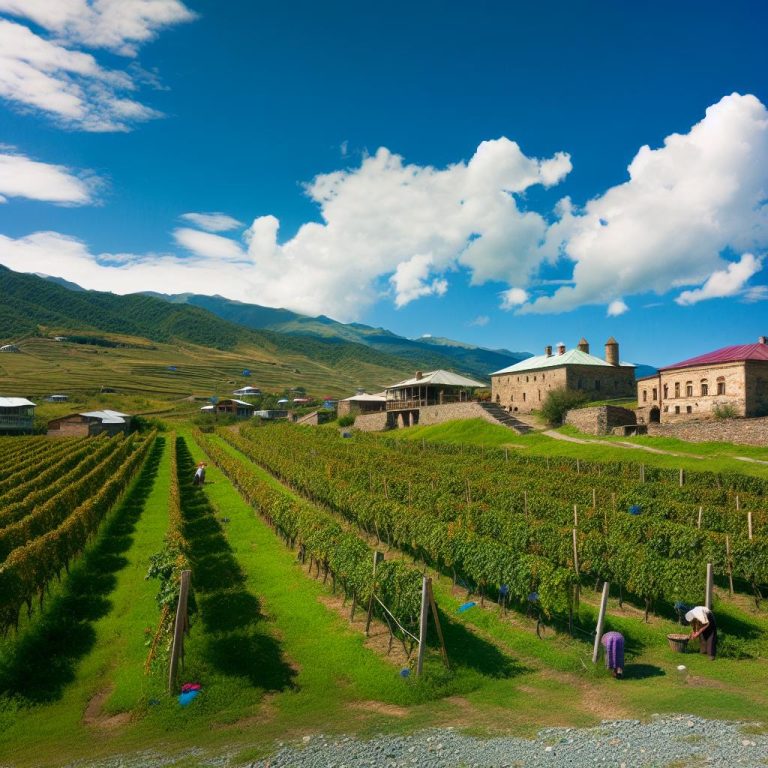Introduction to Georgia’s Unique Indigenous Grape Varieties
Georgia, nestled at the crossroads of Europe and Asia, is often celebrated as the cradle of winemaking. Home to numerous unique grape varieties, it boasts a rich vinicultural heritage that spans thousands of years. This article explores some of these indigenous grape varieties, shining a light on Georgia’s unparalleled contributions to the world of wine.
The Rich Heritage of Georgian Viticulture
Georgia’s viticulture heritage is immensely rich, with evidence of winemaking dating back over 8,000 years. The country’s unique climate, ranging from the humid subtropical regions in the west to the dry and continental areas in the east, fosters the growth of a wide array of grape varieties. This geographical diversity allows for the cultivation of grapes that vary significantly in taste, aroma, and appearance, making Georgian wines distinct and varied.
Rkatsiteli
Rkatsiteli is one of Georgia’s oldest and most prized white grape varieties. Its versatility is evident in its ability to thrive in various climates, from the humid regions of Kakheti to the cooler areas of Kartli. Known for its high acidity and complex flavors, wines produced from Rkatsiteli grapes exhibit notes of apple, quince, and citrus. These attributes make Rkatsiteli grapes particularly suitable for both traditional Georgian and modern winemaking techniques. The wines are often described as having a crisp and refreshing profile, making them an excellent choice for both new and seasoned wine enthusiasts.
Saperavi
Among the red grape varieties, Saperavi stands out as a cornerstone of Georgian winemaking. Known for its deep color and robust character, Saperavi is unique due to its teinturier status, meaning it is one of the few grape varieties with red flesh. This inherent trait allows the grape to produce wine that is rich in color and flavor. Saperavi produces a full-bodied wine that is richly flavored with hints of dark berries and spices. This grape variety is highly sought after for its ability to age well, often resulting in wines that can last for many years. For those interested in exploring this variety further, learn more about Saperavi wines here.
Chinuri
Chinuri is another significant Georgian grape variety, renowned for its vibrant acidity and crisp, refreshing taste. Predominantly grown in the Kartli region, Chinuri is often used to produce sparkling wines due to its naturally high acid profile. The flavors of Chinuri are often described as encompassing green apple, pear, and a hint of floral notes. This makes it a delightful choice for wine enthusiasts seeking something distinct. The high acidity of Chinuri also lends itself well to the production of wines with a refreshing zesty quality.
Traditional Winemaking Techniques
Georgia is also known for its ancient winemaking techniques, particularly the use of Qvevri, large clay vessels buried underground. This method, recognized by UNESCO as a masterpiece of the world’s intangible cultural heritage, allows for the natural fermentation of grape juice with skins. The Qvevri method imparts unique flavors and textures to the wine, creating a profile that is different from modern winemaking techniques. Wines produced in Qvevri are often characterized by their complex texture and full-bodied nature, setting them apart from other wines across the globe.
Conclusion
Georgia’s indigenous grape varieties are a testament to its long-standing vinicultural traditions. Each variety, with its own unique characteristics and flavors, contributes to the diversity and richness of Georgian wines. As the global interest in wine continues to grow, Georgia’s unique offerings provide a refreshing perspective on traditional winemaking practices. Exploring the wines made from these indigenous grapes opens a gateway to understanding and appreciating the rich heritage of Georgian viticulture.
The rich tapestry of Georgian winemaking invites wine lovers to explore an array of flavors found nowhere else. By taking the time to understand these unique grape varieties, one can gain a deeper appreciation for a culture that values tradition and authenticity in winemaking. Moreover, the continuation of these time-honored practices ensures that the unique qualities of Georgian wines will continue to be celebrated for generations to come.
In conclusion, Georgian wines offer a distinctive choice for those passionate about exploring the depths of wine culture. These wines not only tell the story of a region rich in history but also offer an authentic taste that captures the spirit of a nation dedicated to the craft of winemaking.
